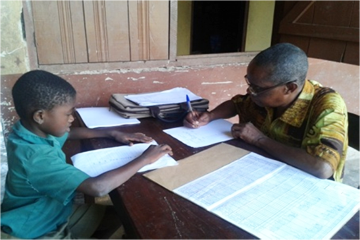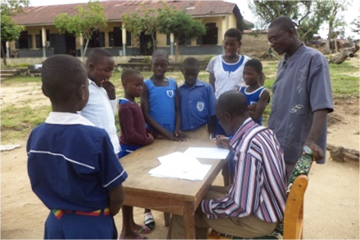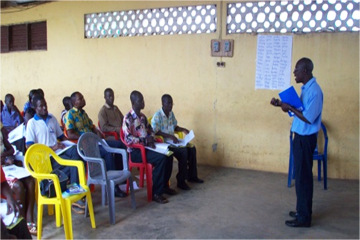Enlightening the Hearts - Literacy Program

Enlightening the Hearts - Literacy Program
The Training for Transformation (TfT) program responds to the Government of Ghana and the Ministry of Education’s request for partners to support the improvement of quality education at the primary and basic education levels in Ghana (MOE, 2010). The MOE’s Education Strategic Plan 2010 to 2020 places particular emphasis on ensuring that increased literacy and numeracy capabilities and achievement rates are attained particularly at the primary level of education in Ghana. Given the large number of development partner interventions focuses on early grade literacy.
The intermediate objectives of the project and indicators are to:
- Improve literacy levels and reading abilities of P4, P5 and P6 students after the first and second year cycle; (Indicators: Ministry of Education’s NEA and SEA results in districts and target schools; impact assessment from Olinga annual tests at the end of the year).
- To reduce teacher absenteeism and increase time on task at the literacy hour among teachers in target schools (on site observation recorded by District Circuit supervisors and PTA/SMC mobile phone technology to track absenteeism).
- To reduce the usage of abuse and physical punishments towards the child and creating a child friendly teaching environment through participative methods of language instruction and alternative disciplinary practices in at least 40% of Olinga target schools. (Classroom observation and PTA and SMC feedback questionnaire).
- Increasing the level of community participation in the supervision and oversight of their teachers and ensuring time on task is improved. (Indicators: number of SMC PTA site visits to schools to observe teaching and learning during literacy period; consultations on test results at the baseline and end of year evaluation process using the School Performance Appraisal Meetings (SPAM) with School Management Committees (SMC's).
The Olinga Foundations approach to implementation includes the following process:
- Consultations with the district education office and district assembly are made in order to initiate a memorandum of understanding outlining: roles and responsibilities, the key cost sharing and implementation agreements etc.
- A planning meeting is held with all district education staff to set up the criteria and agree on criteria for school selection in the program using a targeting approach and systematic roll out (e.g. two to three circuits for entry each year of the program and selection of rural primary schools).
- Teachers and head teachers are trained in the EHL methodology on a GES circuit basis covering about 50 schools in each district each year according to the available resources. The involvement of schools depends on the available funds at the disposal of the Olinga Foundation, the district education office and district assembly.
- On-site supervision of all the newly trained teachers is a vital component of the program ensuring that both Olinga and GES staff visit all the teachers who have been trained to conduct classroom observation (1-2 literacy sessions) and then provide feedback in a systematic and appreciative manner which builds teacher confidence. The on-site supervision is then tabulated by GES staff to track “active and non active schools” depending on the teachers’ presentation, preparation, instruction roll out and usage of the literacy primers.
- Refresher cluster based training programs are organized at the cluster (sub circuit) level which brings about 10-15 teachers from the primary schools together to assess the progress of the programs and refresh the teachers on the basic methodologies.
- The Olinga Foundation conducts a baseline and summative evaluation at the end of each annual project cycle in collaboration with the Ghana Education Service to assess the literacy attainment/outcomes, effectiveness and efficiency of the program in transforming learners achievement rates at each level (P4 to P6) across program and non program schools; literacy results among learners from program and non program schools are compared after the nine month literacy program cycle. Teachers and school profiles are also generated which embed the data in a context analysis drawing out the reasons behind high and low performing schools.
Campaign Objectives:
The Enlightening the Hearts Literacy campaign has the following objectives:
- To promote literacy and moral education among junior youth in rural deprived areas of the country.
- To effect a transformation in the spiritual and material progress of the individual and community.
To assist children and adults access the Holy Word of God through learning to read and write, particularly in their mother tongue.
Promoting Material and Spiritual Development
The Enlightening the Hearts Literacy Campaign is a national campaign assisting children and junior youth increase literacy skills in order to improve their material and spiritual development. Working in three of the most deprived and educationally disadvantaged regions of the country, the campaign assists district education offices and community based organisations implement literacy programmes appropriate to their various contexts.
The Approach
The Enlightening the Hearts Literacy Campaign believes that literacy and moral education are essential to the progress and development of society and is the basis for development.
The literacy materials produced by the project are based on the Holy Writings from three major religions: Christianity, Islam, and the Bahá’í Faith. Experience over the last five years in three language groups - Twi, Ewe, and Dagbani - has proven that this approach speeds the learner's ability to acquire basic literacy skills.
Access to Holy Writings can also stimulate individual and collective transformation. It also ensures human capacity development such that their full potential is released.



